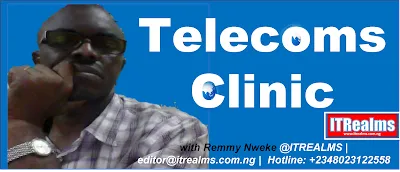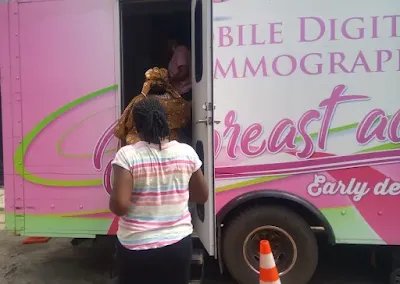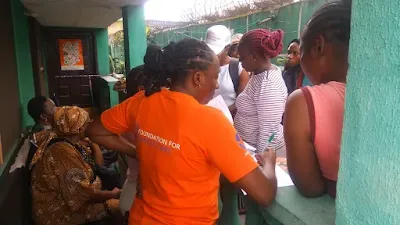As part of the 2023 Breast Cancer Awareness campaign, REMMY NWEKE highlights the need for men to pay closer attention, especially as information about male breast cancer gains momentum in a 21-day outreach.
What is e-Health?
The past 21 days of October 2023 have been expository outreach leveraging the deployment of the information and communication technologies (ICTs) for electronic health (e-health) focused on breast cancer like never before.E-Health, thus, is defined by the World Health Organization (WHO) as “the use of information and communications technology in support of health and health-related fields,” as buttressed by the allusion by experts at Science Direct, which states among other things that “eHealth provides a high potential platform to transform health care practices and work flows through computerized information and decision-making systems that facilitate and coordinate the care of patients.”
While the open sourced encyclopedia, Wikipedia, described eHealth as healthcare services supported by digital processes, communication or technology such as electronic prescribing, tele-health or Electronic Health Records (EHRs), noting that the use of electronic processes in healthcare dated back to at least the 1990s.
The 21-day agenda:
Top on the list of expositories within this 21-day e-health outreach agenda hosted by the Lagos Civil Society for Cancer Eradication in Nigeria (CiSCANEN) led by Mrs Ifelunwa Aipoh as part of the month-long national cancer campaign for October 2023, was the revelation that even men also have breast cancer.
Climaxing the Day 21 outreach shared on social media including WhatsApp, according to the Lagos CISCANEN chapter coordinator, Mrs. Aipoh, was the free breast cancer screening, strictly for women 40 years and above at the St. Luke's Medical Center, Ijeshatedo, Surulere-Lagos with highlights narrowed on health talk and free mammogram by Foundation for Cancer Care and supported by CISCANEN.
Top on the list of expositories within this 21-day e-health outreach agenda hosted by the Lagos Civil Society for Cancer Eradication in Nigeria (CiSCANEN) led by Mrs Ifelunwa Aipoh as part of the month-long national cancer campaign for October 2023, was the revelation that even men also have breast cancer.
Climaxing the Day 21 outreach shared on social media including WhatsApp, according to the Lagos CISCANEN chapter coordinator, Mrs. Aipoh, was the free breast cancer screening, strictly for women 40 years and above at the St. Luke's Medical Center, Ijeshatedo, Surulere-Lagos with highlights narrowed on health talk and free mammogram by Foundation for Cancer Care and supported by CISCANEN.
What is mobile mammogram?
Mobile mammograms are mammography machines deployed in a bus or van that X-ray images of a given breasts designed to detect cancers and other changes in breast tissue. A mammogram could be used either for screening or for diagnostic purposes: Screening mammogram is used to detect breast changes that could be cancerous in people who have no signs or symptoms.
The process is known to be non-invasive, while the technology looks and feels similar to traditional mammography. However, the advanced technology helps radiologists visualize the details in dense breast tissue and detect breast cancer earlier, as reported by Henry Ford Health Team.
The process is known to be non-invasive, while the technology looks and feels similar to traditional mammography. However, the advanced technology helps radiologists visualize the details in dense breast tissue and detect breast cancer earlier, as reported by Henry Ford Health Team.
Looking beyond prostrate cancer:
Universally, prostate cancer is cancer that occurs in the prostate, which is a small walnut-shaped gland in males that produces the seminal fluid that nourishes and transports sperm. Prostate cancer is one of the most common types of cancer.
Reportedly, the risk of prostate cancer indicated that about 1 man in every eight (8) will be diagnosed with prostate cancer during his lifetime. Prostate cancer is more likely to develop in older men and in non-Hispanic Black men. About 6 cases in 10 are diagnosed in men who are 65 or older, and it is rare in men under 40.
Results by the National Institutes of Health (NIH) showed that prostate cancer has become the number one cancer in Nigerian men and constitutes 11 per cent of all male cancers. Whereas, in the present study, males accounted for 9% of all breast cancers, similar to 9% reported from Zaria, 8.6% from Jos and 8% from Eastern Nigeria, respectively [8–10]. However, it is higher than other Nigerian studies including 1.47% from Nnewi and 2.5% from Benin [18, 19].
Take aways for men
The take away on male breast cancer as part of the breast cancer awareness month of course, affirmed "Yes! Men also have breasts and they could also develop breast cancer."
According to the Nigerian Medical Association (NMA) male breast cancer is very rare with only 1 in every 100 breast cancer cases diagnosed are in men. Pointing out that when this rare occasion occur, they are of same types as seen in women.
The symptoms, NMA said are similar to that of women but lamented that unfortunately men commonly present with late disease, because they do not undergo routine breast cancer screening like women.
Nevertheless, NMA noted that most of the predisposing factors are also similar to that for female breast cancer which include getting older, especially for those above 50 years while women is from 40; genetic mutations, family history of breast cancer, previous radiation therapy to the chest, conditions affecting the testes such as injury, swelling or surgical removal of the testes; obesity and overweight, chronic liver disease or liver cirrhosis.
NMA equally noted that all of the treatments listed for female breast cancer, also apply to their male counterparts, stressing that what could be done medically, depends largely on the stage at which the patient presents himself for medical checks, even as earlier presentation, at a lower stage, is more likely to yield a preferable outcome.
Take aways for men
The take away on male breast cancer as part of the breast cancer awareness month of course, affirmed "Yes! Men also have breasts and they could also develop breast cancer."
According to the Nigerian Medical Association (NMA) male breast cancer is very rare with only 1 in every 100 breast cancer cases diagnosed are in men. Pointing out that when this rare occasion occur, they are of same types as seen in women.
The symptoms, NMA said are similar to that of women but lamented that unfortunately men commonly present with late disease, because they do not undergo routine breast cancer screening like women.
Nevertheless, NMA noted that most of the predisposing factors are also similar to that for female breast cancer which include getting older, especially for those above 50 years while women is from 40; genetic mutations, family history of breast cancer, previous radiation therapy to the chest, conditions affecting the testes such as injury, swelling or surgical removal of the testes; obesity and overweight, chronic liver disease or liver cirrhosis.
NMA equally noted that all of the treatments listed for female breast cancer, also apply to their male counterparts, stressing that what could be done medically, depends largely on the stage at which the patient presents himself for medical checks, even as earlier presentation, at a lower stage, is more likely to yield a preferable outcome.
In conclusion:
The 21st day breast cancer awareness month left a lot of facts and lessons despite that October has not ended and these are not limited to the fact that breast cancer affects men too, though it is only far less common; breast cancer could be better treated, when caught or presented early.
In addition, they submitted that if several female members of any family, especially first-degree relatives; is discovered to have developed breast cancer, moreso when they do so at very young ages like in their 20's, its advisable to ensure they see a doctor and discuss about genetic testing and screening thereof.
Above all, the deployment of mobile mammography for free breast cancer screening, by Foundation for Cancer Care supported by CISCANEN and the awareness campaign courtesy of NMA Committee on Cancer Awareness Prevention and Treatment cannot go without commendations.
Going by the fact that health is wealth and should be everyone’s business of interest, mostly men, the health stakeholders should continue to drum support for awareness creation including mainstreaming the media, and deploying every tools in this digital era to reach as many people as possible given several kinds of cancer that exist in our society.





SELLING FULLZ|PROS|LEADS
ReplyDeleteFRESH & NEVER SOLD
LEGIT & VERIFIED INFO
USA|UK|CANADA AVAILABLE
BULK QUANTITY
ICQ 752822040 , @killhacks
Tel.G @leadsupplier , @killhacks
Skype|Wickr @peeterhacks
Email bigbull0334 @ onion mail . org
CC CVV WITH BILLING ADDRESS
SSN DOB DL ADDRESS EMPLOYEE & BANK INFO
SIN DOB ADDRESS
DEAD FULLZ
ORIGINAL DL SCAN FRONT BACK WITH SELFIE & SSN
HIGH CREDIT SCORES PROS
YOUNG AGE FULLZ
BUSINESS EIN COMPANY FULLZ
CLONNING DUMPS TRACKS 101 & 202 WITH PIN
FULLZ FOR KYC|SBA|UI|PUA|TAX RETURN|UBER EATS|DOORDASH
High quality databases available
Fresh spammed from reliable resources
Bulk buyers will get big discount offers
24/7 assistance
Addressing breast cancer among men is an essential yet often overlooked conversation in healthcare. 'Breast cancer: Hello men!' signifies the crucial need to shatter stereotypes and raise awareness about this disease's impact on men. Encouraging early detection, education, and breaking the stigma surrounding male breast cancer is pivotal for fostering a proactive approach to men's health. This campaign serves as a beacon, urging men to prioritize their well-being and join the conversation, emphasizing that breast cancer doesn't discriminate based on gender.
ReplyDelete